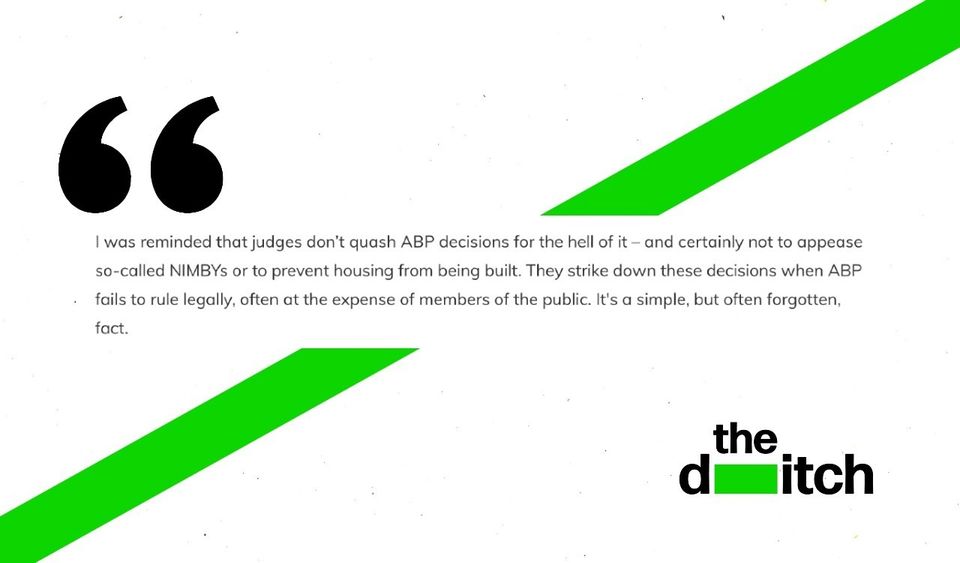I don’t believe the judiciary is above criticism. I never have. It probably isn't scrutinised enough and often benefits from the unhealthy deference to authority so prevalent across the Irish establishment.
Things aren’t so simple for senior civil servants. It gets messy when high-level state appointees get into the business of criticising the people responsible for keeping the state in check. They know this. The recently appointed chairperson of An Bord Pleanála (ABP), Oonagh Buckley, knows this. She knew it when she fired an unfounded attack at the two High Court judges who have provided the only means of redress for all the people affected by the years-long scandal engulfing ABP.
Senior civil servants, as well as government ministers, have traditionally avoided criticising judges, knowing that, as part of the executive branch of government, they shouldn’t have any role in holding the judiciary to account.
The Irish constitution says judges can only be removed from office by a majority of the Oireachtas. The state, in a recent and long overdue development, introduced the Judicial Conduct Committee, which allows members of the public to submit complaints against individual judges. Though not as powerful a forum as it could be, the committee at least gives some level of voice to candidates more suitable for the criticism of judges than high-level state representatives.
The courts’ role in holding ABP to account, following serious wrongdoing exposed by The Ditch, became clearer over the course of the last year. In some instances the only recourse for those affected by poor governance at ABP came in the High Court, with generally no other available mechanism to challenge ABP’s decisions – which were in many cases illegal.
With two words come rare insight
Two judges run the High Court’s planning list: Richard Humphreys and David Holland.
I became familiar with their work during The Ditch’s in-depth investigation into ABP, reading through High Court judgment after another. If I learnt anything from my reading, it’s that the quality and nuance of their judgments should be considered the benchmark for the rest of the judiciary.
I was reminded that judges don’t quash ABP decisions for the hell of it – and certainly not to appease so-called NIMBYs or to prevent housing from being built. They strike down these decisions when ABP fails to rule legally, often at the expense of members of the public. It's a simple, but often forgotten, fact.
ABP chairperson Oonagh Buckley last month, in remarks that she refuses to address, suggested she prefers to wield her quasi-judicial power without the oversight of the courts.
“We also have two very activist judges working on the planning lists and they are making very far-reaching decisions,” she said during a sitting of the Dáil Public Accounts Committee.
She denigrated two judges, Humphreys and Holland, with the term ‘activist judge’, typically used as a pejorative for judges who are perceived to answer to their personal ideology rather than the law and constitution.
In saying just two words she gave rare insight into the contempt some state-appointed bureaucrats have for judicial scrutiny. Those who have engaged with senior civil servants during judicial review litigation will share stories of the disdain some of them have for the courts and their reluctance to answer for their administrative decision-making.
Buckley’s attack was a cowardly one – she knows that judges are limited in how they can respond to such comments. It was a calculated attempt to undermine the people she wrongly blames for ABP’s problems, the same people society relies on for protection from the consequences of institutional state failure, the likes of which has defined ABP for the last almost-decade.
There was also an irony in what Buckley said. It exposed her own activism, the type that involves subtly undermining fundamental constitutional safeguards. She was perhaps emboldened by housing minister Darragh O’Brien’s latest planning bill, which seeks to further reduce the judicial oversight of planning decisions, suggesting that the government’s current position is that the best way to reform ABP is to dilute its accountability. Anyone concerned with government accountability and transparency should worry about this position.
The judiciary, despite its imperfections and antiquated practices, is indispensable. It reviews the state’s interaction with its citizens. It holds the state to account when nobody else can or will. Without an independent judiciary the state could act with impunity. It's one of the fundamental ideological principles that distinguishes democratic governments from their fascist counterparts. For this reason alone the judiciary must be afforded a degree of protection.
Leaving her ideology and motives aside, when Buckley agreed to her appointment as chairperson, she knew it came with certain responsibilities. One is that she doesn’t get to attack the people who hold her to account. It's a small ask considering she is paid €205,000 a year.
Buckley has unfortunately dispensed with even the pretence of a willingness to accept criticism or to bring about change to a discredited state body. At least, maybe, she’s honest about it.


